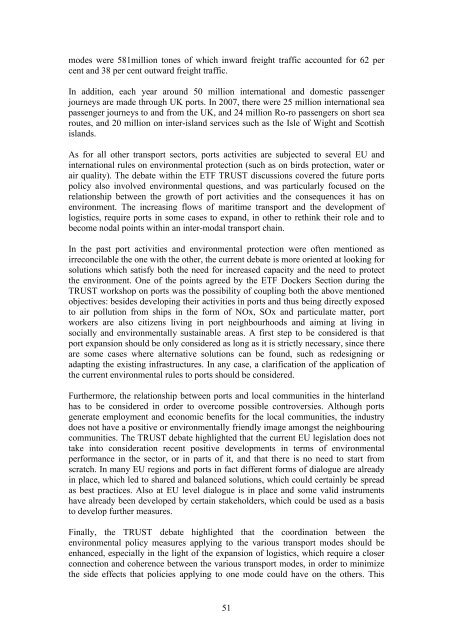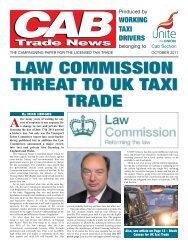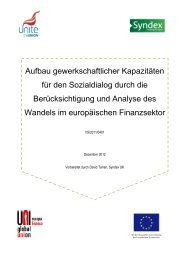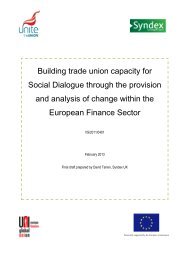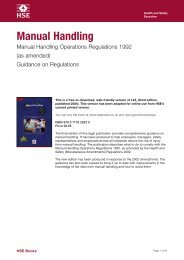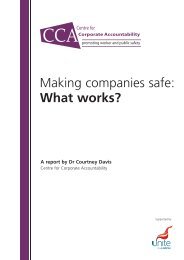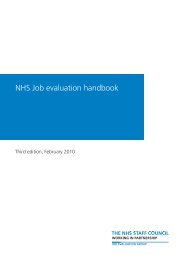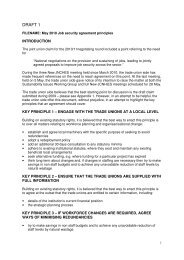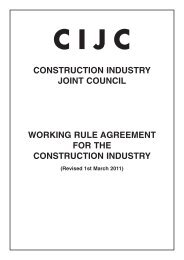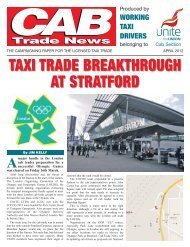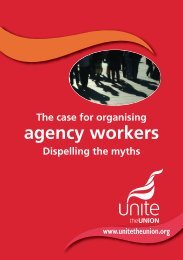Sustainable Transport and the Environment Guide - Unite the Union
Sustainable Transport and the Environment Guide - Unite the Union
Sustainable Transport and the Environment Guide - Unite the Union
You also want an ePaper? Increase the reach of your titles
YUMPU automatically turns print PDFs into web optimized ePapers that Google loves.
modes were 581million tones of which inward freight traffic accounted for 62 per<br />
cent <strong>and</strong> 38 per cent outward freight traffic.<br />
In addition, each year around 50 million international <strong>and</strong> domestic passenger<br />
journeys are made through UK ports. In 2007, <strong>the</strong>re were 25 million international sea<br />
passenger journeys to <strong>and</strong> from <strong>the</strong> UK, <strong>and</strong> 24 million Ro-ro passengers on short sea<br />
routes, <strong>and</strong> 20 million on inter-isl<strong>and</strong> services such as <strong>the</strong> Isle of Wight <strong>and</strong> Scottish<br />
isl<strong>and</strong>s.<br />
As for all o<strong>the</strong>r transport sectors, ports activities are subjected to several EU <strong>and</strong><br />
international rules on environmental protection (such as on birds protection, water or<br />
air quality). The debate within <strong>the</strong> ETF TRUST discussions covered <strong>the</strong> future ports<br />
policy also involved environmental questions, <strong>and</strong> was particularly focused on <strong>the</strong><br />
relationship between <strong>the</strong> growth of port activities <strong>and</strong> <strong>the</strong> consequences it has on<br />
environment. The increasing flows of maritime transport <strong>and</strong> <strong>the</strong> development of<br />
logistics, require ports in some cases to exp<strong>and</strong>, in o<strong>the</strong>r to rethink <strong>the</strong>ir role <strong>and</strong> to<br />
become nodal points within an inter-modal transport chain.<br />
In <strong>the</strong> past port activities <strong>and</strong> environmental protection were often mentioned as<br />
irreconcilable <strong>the</strong> one with <strong>the</strong> o<strong>the</strong>r, <strong>the</strong> current debate is more oriented at looking for<br />
solutions which satisfy both <strong>the</strong> need for increased capacity <strong>and</strong> <strong>the</strong> need to protect<br />
<strong>the</strong> environment. One of <strong>the</strong> points agreed by <strong>the</strong> ETF Dockers Section during <strong>the</strong><br />
TRUST workshop on ports was <strong>the</strong> possibility of coupling both <strong>the</strong> above mentioned<br />
objectives: besides developing <strong>the</strong>ir activities in ports <strong>and</strong> thus being directly exposed<br />
to air pollution from ships in <strong>the</strong> form of NOx, SOx <strong>and</strong> particulate matter, port<br />
workers are also citizens living in port neighbourhoods <strong>and</strong> aiming at living in<br />
socially <strong>and</strong> environmentally sustainable areas. A first step to be considered is that<br />
port expansion should be only considered as long as it is strictly necessary, since <strong>the</strong>re<br />
are some cases where alternative solutions can be found, such as redesigning or<br />
adapting <strong>the</strong> existing infrastructures. In any case, a clarification of <strong>the</strong> application of<br />
<strong>the</strong> current environmental rules to ports should be considered.<br />
Fur<strong>the</strong>rmore, <strong>the</strong> relationship between ports <strong>and</strong> local communities in <strong>the</strong> hinterl<strong>and</strong><br />
has to be considered in order to overcome possible controversies. Although ports<br />
generate employment <strong>and</strong> economic benefits for <strong>the</strong> local communities, <strong>the</strong> industry<br />
does not have a positive or environmentally friendly image amongst <strong>the</strong> neighbouring<br />
communities. The TRUST debate highlighted that <strong>the</strong> current EU legislation does not<br />
take into consideration recent positive developments in terms of environmental<br />
performance in <strong>the</strong> sector, or in parts of it, <strong>and</strong> that <strong>the</strong>re is no need to start from<br />
scratch. In many EU regions <strong>and</strong> ports in fact different forms of dialogue are already<br />
in place, which led to shared <strong>and</strong> balanced solutions, which could certainly be spread<br />
as best practices. Also at EU level dialogue is in place <strong>and</strong> some valid instruments<br />
have already been developed by certain stakeholders, which could be used as a basis<br />
to develop fur<strong>the</strong>r measures.<br />
Finally, <strong>the</strong> TRUST debate highlighted that <strong>the</strong> coordination between <strong>the</strong><br />
environmental policy measures applying to <strong>the</strong> various transport modes should be<br />
enhanced, especially in <strong>the</strong> light of <strong>the</strong> expansion of logistics, which require a closer<br />
connection <strong>and</strong> coherence between <strong>the</strong> various transport modes, in order to minimize<br />
<strong>the</strong> side effects that policies applying to one mode could have on <strong>the</strong> o<strong>the</strong>rs. This<br />
51


